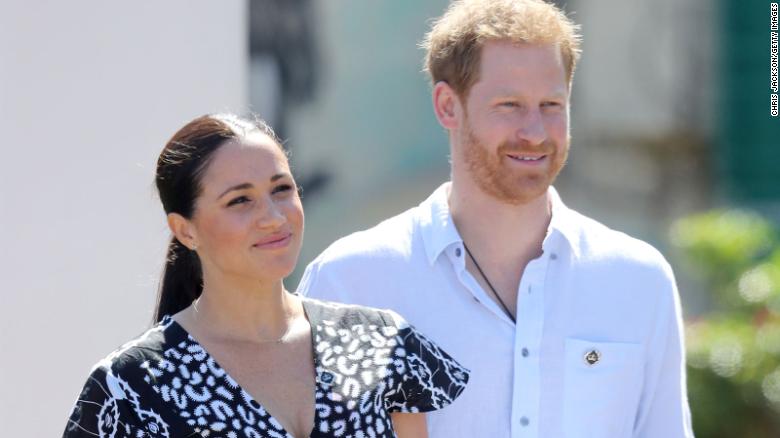Meghan redefined what it means to be a royal during the Africa tour

Meghan had been married, succeeded as an actress and been an outspoken activist, most notably on women’s rights. She was already defined, so her challenge was how to step up to her new royal career while staying true to what she represented before. Over the last 10 days, supported by her husband, Prince Harry, she proved how she was able to do that, and in a very powerful way.We are used to seeing a red-carpet treatment for incoming royals at the start of an international tour. But it was different here. The Duke and Duchess of Sussex flew into Cape Town last Monday and headed straight to their first stop in the Nyanga township for their first media moment. They arrived at the Justice Desk, a non-profit organization operating in South Africa, Zambia and Zimbabwe, to see how girls from the area are being taught to empower and defend themselves.In a speech, the Duke talked about “redefining masculinity” while the Duchess spoke “as a woman of color and as your sister.” She added that “the rights of women and girls is something that’s very close to my heart and a cause I’ve spent the majority of my life advocating for.” And with that she set the tone for the rest of the tour. Each key moment after that spoke to the same thing, leaving nobody in any doubt over her mission.As the royal couple danced out of the engagement to thumping beats, it felt like they had found their groove — more relaxed and more engaged than I have seen during previous joint engagements. Perhaps the Duchess had also discovered the same connection with this part of the world that her husband has long enjoyed.A lady she had tea with later — Nazli Edross-Fakier — told CNN: “I think the whole Cape Town tour has been a relaxed thing and she’s pleasantly surprised at the welcome and the niceness of the people.”The Duchess also gushed about how “how happy she was being a new mom.” Parenthood changes your perspective on everything and for this couple, it appears to have given them a greater sense of urgency about their work. Every time they spoke, they couldn’t hold back their concern for the way many things are going in the world, while highlighting the positives.”What’s so amazing about being here today is seeing there is so much good happening in the world and there’s so much positivity, and … diversity and inclusivity,” Meghan told me in a rare on-camera moment. She was speaking moments after she and Harry had visited Waves for Change, a mental-health initiative that uses surfing to steer vulnerable children away from violence in townships. The Duke has previously spoken about his own mental health issues following the death of his mother, the late Princess Diana — so it’s an issue very close to his heart.However, coverage of the tour was overshadowed after the the Duchess launched legal action against a British tabloid newspaper for unlawfully publishing a private letter. In a deeply emotional 500-word missive, Harry accused the British tabloid press of waging a campaign against his wife that mirrored the treatment meted out to his mother. “There comes a point when the only thing to do is to stand up to this behaviour, because it destroys people and destroys lives,” the Duke said in a statement. “Put simply, it is bullying, which scares and silences people. We all know this isn’t acceptable, at any level. We won’t and can’t believe in a world where there is no accountability for this.”While the Mail on Sunday has said it stands by its reporting, the Duchess’ legal moves emphasized that she intends on being a royal who will fight for what she believes is right. There were Diana references throughout the tour, both subtle and direct. In Huambo, Angola, he retraced her footsteps through a live minefield back in 1997. He did so to remind the world of how pioneering her work was. She’s widely credited with creating the momentum for an international treaty to ban landmines. “Twenty-two years after my mother visited Angola, there are still more than 1,000 minefields in this beautiful country that remain to be cleared,” he said on the road that has been built over the pathway graced by Diana. “I wonder if she was still alive whether that would still be the case. I’m pretty sure she would have seen it through.”Diana also came up during a meeting with civil rights legend Archbishop Desmond Tutu. The 87-year-old Nobel laureate presented Harry a framed photograph of his mother with former South African President Nelson Mandela. But someone else in the room stole the limelight with a huge smile across his face. This rare glimpse of the couple’s four-month-old son Archie soon went viral — one in particular. It showed him in his mother’s arms with the elder statesman leaning in to kiss the baby’s head. Another moment that resonated with fans and strangers alike was captured by a palace staffer during a private visit by Meghan to a memorial for the murdered South African student Uyinene Mrwetyana. The brutal crime sparked widespread outrage and highlighted the issue of femicide. The Duchess wrote “we stand together in this moment” on a ribbon that she tied to the memorial.Was it a good picture? Not particularly. Was it highlighting a new case? No. But the image resonated because it rang true. It felt like a genuine gesture from someone who’s proved beyond doubt that women’s rights matter to her greatly. What made the moment even more powerful was that she wrote her message in a local language — Xhosa. That’s not her speaking as a royal, that’s her speaking as a “sister,” as she put it earlier on in the tour.She did it again during a roundtable discussion at the University of Johannesburg. As they talked about support for women in education, she dropped in that she had only been able to go to college because of financial assistance and “families chipping in.” You don’t expect to hear that from a royal. One student involved in the debate, Tuni Mampame, told CNN how inspiring it was to hear that from someone who “looks like me, is as inspired as me, who possibly has the same background as me.”Rather than downplaying her very regular upbringing, the Duchess of Sussex is making a virtue of it. She’s continuing to fight the battle for equality she has always fought and she’s picking out elements of her life to make her more relatable. She’s doing the same for the royal family because none of her in-laws have the same experience. To connect with people in South Africa, a country she had never visited before, is no mean feat and that message has resonated around the world. “In a world that that can seem so aggressive, confrontational, and dangerous, you should know that you have the power to change it,” Meghan said during one of her final engagements in South Africa. “Because whether you’re here in South Africa, at home in the UK or the US, or around the world, you actually have the power within you to change things, and that begins with how you connect to others.Meghan has clearly demonstrated over the last 10 days how she is stepping into her role as a royal. She’s owning it in the same way Diana did by engaging personally in issues she so evidently connects with.If Harry is continuing his mother’s legacy by adopting her causes, then Meghan may also be, intentionally or not, adopting her spirit.





